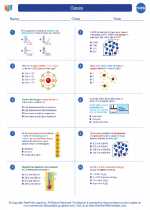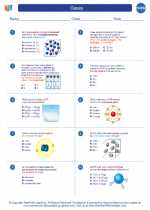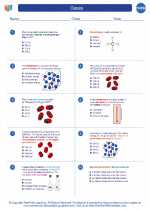Cell
A cell is the basic structural, functional, and biological unit of all known living organisms. Cells are often called the "building blocks of life." The study of cells is called cell biology.
Types of Cells
There are two main types of cells: prokaryotic cells and eukaryotic cells.
- Prokaryotic cells: These are simpler and smaller cells that lack a nucleus and other membrane-bound organelles. Examples of prokaryotic cells include bacteria and archaea.
- Eukaryotic cells: These are more complex cells that contain a nucleus and other membrane-bound organelles. Examples of eukaryotic cells include plant and animal cells.
Cell Structure
Eukaryotic cells have a complex internal structure, including various organelles with specific functions:
- Nucleus: Control center of the cell, containing DNA.
- Endoplasmic reticulum (ER): Network of membranes involved in protein and lipid synthesis.
- Golgi apparatus: Modifies, sorts, and packages proteins and lipids for storage or transport out of the cell.
- Mitochondria: Powerhouse of the cell, involved in energy production.
- Chloroplasts (in plant cells): Site of photosynthesis, where sunlight is converted into chemical energy.
- Lysosomes: Contain digestive enzymes for breaking down waste materials and cellular debris.
- Cytoskeleton: Network of protein filaments that provides structure and support for the cell.
- Cell membrane: Semi-permeable membrane that surrounds the cell, controlling the movement of substances in and out of the cell.
Cell Functions
Cells carry out a variety of functions essential for life, including:
- Metabolism: The chemical processes that occur within a cell to maintain life.
- Reproduction: The ability of cells to divide and produce new cells.
- Response to stimuli: Cells can respond to changes in their environment.
- Growth and development: Cells can grow and differentiate into specialized cell types.
- Homeostasis: Cells maintain a stable internal environment despite external changes.
Cell Theory
The cell theory is a fundamental principle in biology, consisting of three main ideas:
- All living organisms are composed of one or more cells.
- The cell is the basic unit of structure and organization in organisms.
- All cells come from pre-existing cells through the process of cell division.
Study Guide
To study the topic of cells, consider the following key points:
- Understand the differences between prokaryotic and eukaryotic cells, including their structures and functions.
- Learn the main organelles found in eukaryotic cells and their respective functions.
- Explore the various functions that cells perform to maintain life.
- Memorize the principles of the cell theory and its significance in biology.
Additionally, practical activities such as observing cells under a microscope and conducting cell experiments can provide hands-on learning experiences to reinforce the concepts related to cells.



